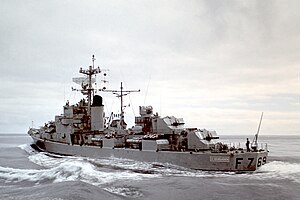Le Normand-class frigate

Bourguignon under way
|
|
| Class overview | |
|---|---|
| Name: | Le Normand class |
| Builders: | F C de la Méditerranèe, A C de la Loire, Penhoët, Arsenal de Lorient |
| Operators: |
|
| Preceded by: | Le Corse class |
| Succeeded by: | Commandant Rivière class |
| Built: | 1956—1960 |
| In commission: | 1956-1985 |
| Completed: | 14 |
| Retired: | 14 |
| General characteristics | |
| Type: | Frigate |
| Displacement: | 1295 ton standard, 1795 ton full load |
| Length: | 99.3 m (326 ft) overall |
| Beam: | 10.3 m (34 ft) |
| Draught: | 4.1 m (13 ft) |
| Propulsion: | 2 shaft Parsons or Le Rateau geared turbines, 2 boilers, 14,914 kW (20,000 hp) |
| Speed: | 28 knots (32 mph; 52 km/h) |
| Range: | 4,500 nmi (5,200 mi; 8,300 km) |
| Complement: | 175 peace, 200 war |
| Sensors and processing systems: |
DRBV 22, DRBC 31 radar, DUBV 1, DUBA 1 sonar |
| Armament: |
|
The Le Normand class (or E52 Type) was a class of 14 fast frigates (Escorteurs Rapide) built for the French Navy in the late 1950s. They were an immediate follow-on from the earlier Le Corse-class (or E50 Type) frigates, and like them, were long-range convoy escorts capable of high speed. The first seven ships, paid for by the United States under the Mutual Defense Assistance Act were ordered in 1952. The remaining seven ships were paid for by France and ordered between 1953 and 1955.
The E52 type shared a flush-decked layout with the E50 class, and had a similar armament of three twin 57mm turrets) (one forward and two aft) and an anti-submarine armament consisting of a battery of heavyweight guided torpedoes and a 375mm Bofors six-barrel rocket launcher. The major difference was the layout of the armament, with the torpedo tubes moving from forwards to amidships, and the Bofors launcher moving from amidships to forward of the bow gun, thus reducing topweight and improving the arc of fire for the Bofors launcher.
The last three ships were completed as a modified version, the Type E52B. This replaced the amidships turret and the Bofors rocket launcher with a new 305mm anti-submarine mortar mounted amidships. Two more of this type were ordered in 1957, but were cancelled owing to financial problems.
...
Wikipedia
